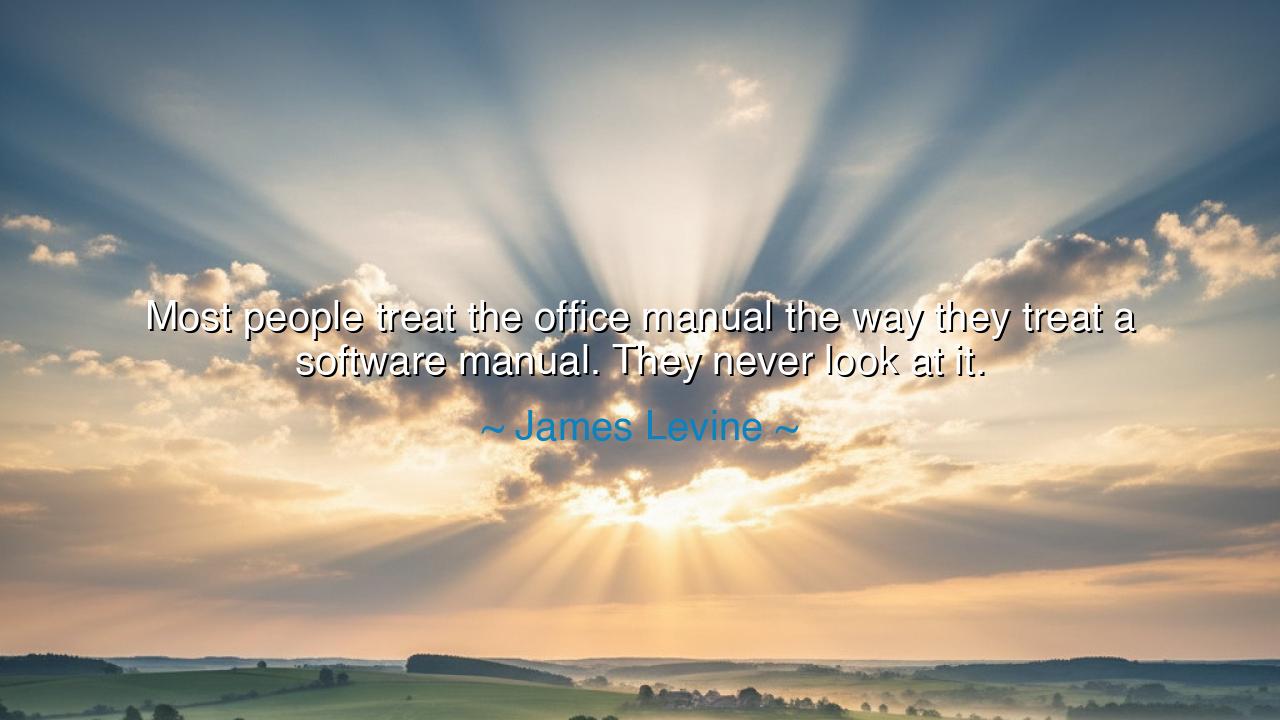
Most people treat the office manual the way they treat a
Most people treat the office manual the way they treat a software manual. They never look at it.






James Levine, with sharp humor and the insight of a teacher, declared: “Most people treat the office manual the way they treat a software manual. They never look at it.” In these words lies not only jest but a piercing truth: that human beings often neglect the very guidance that could ease their struggles, choosing instead to wander by trial, error, and habit. The manual, whether of office or of craft, is the distilled wisdom of those who came before—yet it lies unopened, gathering dust.
The ancients too knew this folly. They wrote scrolls of law, codes of conduct, and sacred texts, but many ignored them, preferring to stumble through life without heed. Thus, history repeats: men scorn the instructions, imagining them tedious, only to suffer the very mistakes those instructions were written to prevent. Wisdom is offered freely, yet pride and impatience close the ear.
Levine’s words also unmask the tension between knowledge and effort. To open a manual requires humility—to admit one does not know, to submit to learning from another’s hand. But many prefer the illusion of mastery, resisting guidance until failure drives them back to it. This is why so many treat manuals with disdain: they are mirrors of one’s ignorance, and men fear that reflection.
Yet within the neglected pages lies treasure. The office manual, like the software manual, is not merely rule or ritual, but a map toward smoother labor, clearer purpose, and fewer mistakes. To ignore it is to walk in darkness while a lantern lies unlit at one’s side. The ancients would call such neglect folly, for wisdom hidden is wisdom wasted, and the cost of ignorance is always heavier than the effort of study.
Let the generations remember: guidance unheeded is as useless as guidance unwritten. The manuals of life—whether found in books, mentors, or tradition—are not burdens but gifts, written to spare us needless toil. Open them, learn from them, and honor those who labored to write them. For in the humility to seek instruction lies the strength to rise above error, and in the willingness to look lies the path to mastery.






MPMai Pham
I love the humor in this quote because it’s so true! How many times have we relied on trial and error rather than referring to the manual? But then it made me think, is this a sign of something deeper—like a reluctance to follow ‘the rules’ or a preference for autonomy? If manuals were written in a more user-friendly way, would more people actually turn to them for guidance, or is this behavior just ingrained?
VANguyen Van An
James Levine’s quote is funny, but it’s also a bit concerning. If most people don’t read office or software manuals, then how much are we really learning on the job? There’s an irony in how we expect to use systems or tools effectively without truly understanding them. Do you think this avoidance is a sign of disengagement, or is it more about a lack of time and priority given to learning the ‘manuals’ in our lives?
TNTrang Nguyen
This quote speaks to a behavior that’s probably all too common in workplaces—people simply don’t look at the resources provided to them. It made me think: what’s the cost of not using these manuals? Are we making mistakes or wasting time that could have been avoided if we just took the time to understand the systems or processes in place? Perhaps there’s a disconnect between how these manuals are presented and how they’re perceived.
HTnguyen thi hue tran
James Levine’s quote reflects a common habit of avoiding manuals altogether. It’s fascinating to me how often people choose trial and error over taking the time to read instructions, even though manuals are designed to save time. Why do you think that is? Are we just too eager to dive in and get to work, or is there a deeper reason we shy away from taking that extra step to understand things fully?
HTNguyen Ha Trang
This quote really resonates with me. I’ve often found myself ignoring manuals, whether they’re for office systems or software. It’s easy to think you’ll figure things out without them. But do you think this is a problem with the way manuals are written? If they were more accessible or engaging, would people be more likely to use them? I guess we often learn the hard way instead of utilizing resources that could make things easier.